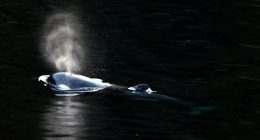
The moves were wide ranging and reflected several dynamics that have played out since Russian President Vladimir Putin invaded Ukraine last week. Some companies have signaled they wanted to take a stand against Russia. At the same time, key parts and commodities that typically flow out of Ukraine, a major agricultural exporter and an auto-parts supplier, have been bottled up inside the country.
Sanctions against Russia, prohibiting a wide range of financial transactions and exports, have businesses halting sales and other operations there. All that has some companies with deep Russian roots reviewing their interests in the country.
Apple said Tuesday it stopped selling iPhones and other products in Russia, saying it was “deeply concerned about the Russian invasion of Ukraine.”
Silicon Valley’s tech giants have been facing particular pressure to cut off services and content to Russia. On Friday, Ukraine’s vice prime minister, Mykhailo Fedorov, asked Apple Chief Executive Tim Cook to stop supplying Apple products and services to Russia, including halting access to the App Store.
Ford on Tuesday said it was suspending its joint-venture operations in Russia, citing concern over the invasion of Ukraine.
Exxon, the U.S. oil giant, said it was preparing to shut down production from the massive Sakhalin Island development in Russia’s Far East. Exxon owns a 30% stake in the project, alongside Russian state-controlled oil producer Rosneft, Japan’s SODECO and India’s ONGC Videsh. The company said it is taking steps to exit the consortium.
Exxon is also developing plans for expatriate staff in Russia to leave the country, if the employees wish to do so, according to a person familiar with the plans. The vast majority of Exxon’s roughly 1000-person workforce in Russia is made up of Russian citizens.
Volkswagen, meanwhile, said it may shutter its flagship German plant later this month because it can’t get parts from suppliers in war-torn Ukraine. Volkswagen had previously idled production at its plant in Zwickau, Germany, its most important factory for producing electric cars, including the ID.4 that is exported to the U.S. Supplies of wiring harnesses—a kit containing wires, connectors and terminals to connect a car’s components—have been interrupted.
Although production at Volkswagen’s Wolfsburg plant is running normally, the auto maker said it expects more restrictive production next week and that it would be “unable to manufacture in Wolfsburg” the week after. Production at its commercial vehicles plant in Hannover would also be impacted, as well as its component factories, the company said.
Bayerische Motoren Werke AG , the German luxury-car maker, said it had stopped exports of vehicles to Russia and would cease assembly of vehicles with a partner in Kaliningrad.
“Due to the current geopolitical situation we will stop our local production and export for the Russian market until further notice,” a spokesman said. BMW also said that supply-chain disruptions, such as the closure of some supplier plants in Ukraine, would hit production at some factories
Commodities giant Glencore GLNCY 0.85% PLC said Tuesday it was reviewing its business in Russia, including stakes in EN+ Group PLC—the controlling shareholder of the world’s No.2 aluminum producer—and oil company Rosneft Oil Co. ROSN 12.10%
Glencore joined a growing list of companies, including BP PLC and Shell PLC, that are assessing their longtime ties with Russia. BP has said it plans to exit its near 20% stake in Rosneft, while energy rival Shell has said it would pull back from joint projects in Russia.
“Glencore condemns the actions taken by the Russian government against the people of Ukraine,” the company said in a statement, adding that it was “reviewing all our business activities in the country.” Glencore owns 10.55% of EN+, which controls United Co. Rusal International PJSC, and around 0.5% of Rosneft.
Dell said it suspended product sales in Russia. Ericsson ERIC -4.53% AB, the Swedish telecom-equipment maker, said it, too, was suspending shipments into Russia.
The world’s biggest container ship operators—A.P. Moller-Maersk A/S and Mediterranean Shipping Co.—said they would temporarily suspend services to Russian ports, even those far from the conflict in Ukraine. Maersk said Tuesday it was halting bookings in light of the sanctions imposed on Russia. Both operators said they would continue to move foodstuffs to and from Russia.
—Tim Higgins, Costas Paris and Nora Eckert contributed to this article.
Write to William Boston at [email protected] and Alistair Macdonald at [email protected]
Copyright ©2022 Dow Jones & Company, Inc. All Rights Reserved. 87990cbe856818d5eddac44c7b1cdeb8









